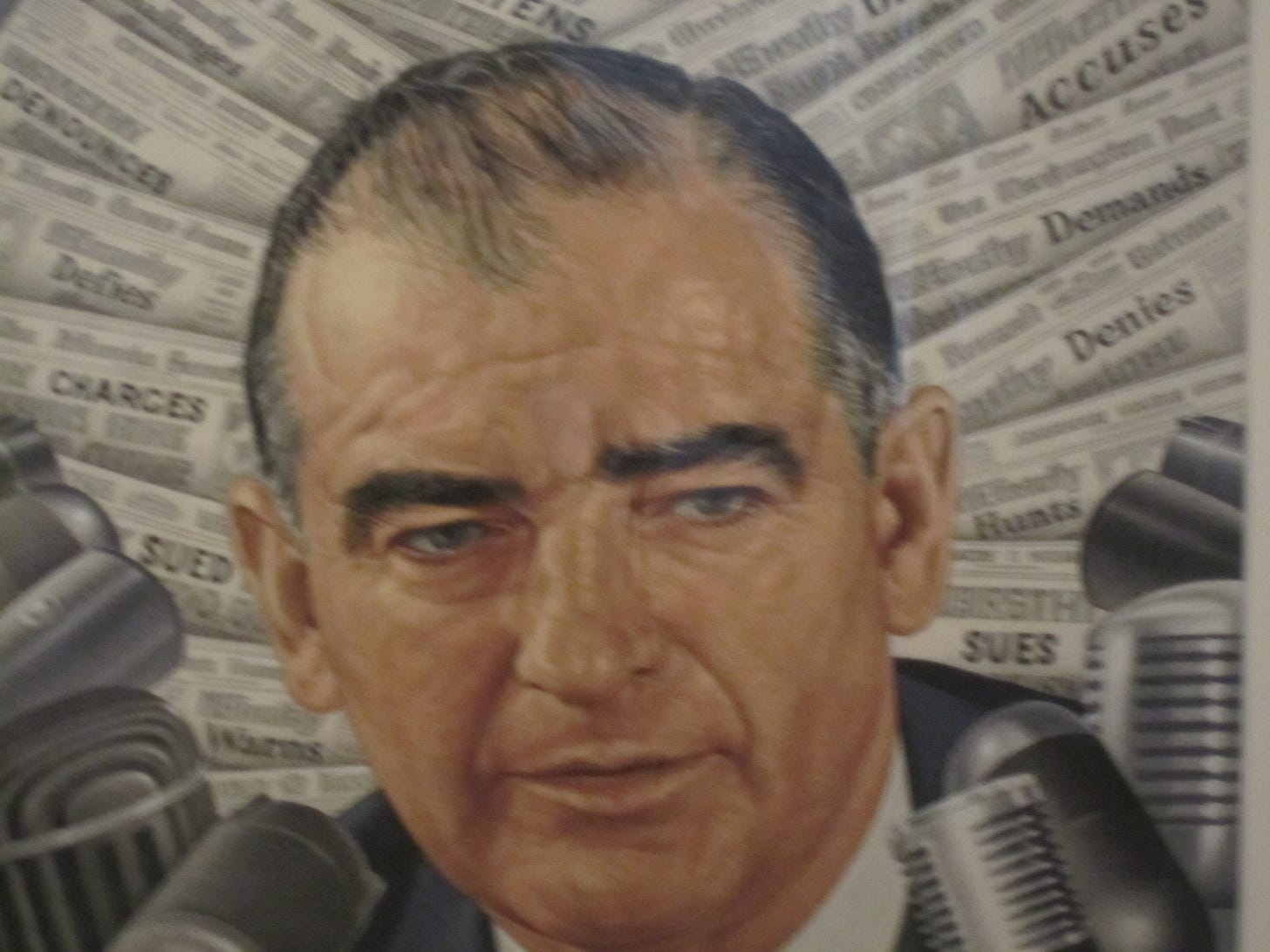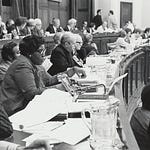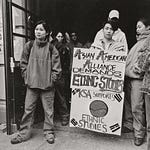
An important theme of this episode is gossip about powerful men having erotic relationships with other men. I want to be clear that there is no new evidence that proves or disproves sexual insinuations about the men we discuss below: by definition, gossip is a believable rumor that isn’t necessarily factual.
When Joseph R. Welch called for decency in the June 1954 Army-McCarthy hearings, it was not just a reference to Wisconsin Republican Senator Joseph R. McCarthy’s attack on a younger lawyer. It was another way for Welch to draw attention to the gossip everyone in the room and many in the television audience had heard: that McCarthy’s associates, Roy Cohn and G. David Schine, were allegedly in a romantic relationship. And there was yet another rumor well known to those in the chamber that day: that McCarthy, married to prominent anti-communist activist Jean Kerr, not only had had sex with men but was enamored of one or both of his handsome young staffers.
Welch’s challenge to McCarthy seemed to turn the tide against one of the most prominent demagogues in modern American history. In December 1954, the Senate acted against their colleague. A coalition of Democrats and liberal Republicans voted to condemn McCarthy for numerous offenses against the ethics rules and dignity of the Senate.
But McCarthy and Cohn were not the only prominent anti-Communists who gossiped and were gossiped about: unmarried FBI Director J. Edgar Hoover deployed sexual rumors as weapons and, at the same time, seemed to have an unusually close friendship with his second in command, Clyde Tolson. As Beverly Gage and I discussed in Episode 6, the two were often seen double-dating with pretty women—dates that never seemed to result in heterosexual romance or marriage.
As historian Christopher Elias argues in his book Gossip Men: J. Edgar Hoover, Joe McCarthy, Roy Cohn, and the Politics of Insinuation (University of Chicago Press, 2021), these three men—Hoover, McCarthy, and Cohn—shaped right-wing politics in the second half of the 20th century, using gossip, insinuation, and rumor to intimidate their political opponents, even as their own personal lives were the objects of popular speculation. Arguably, these men also paved the way for the disinformation and lies that pervade today’s political media strategies, as well as the performances of brute masculinity that became a dominant feature of the Trump presidency. And as Elias points out, these tactics didn’t come from nowhere: they were close kin to a 20th-century tabloid and gossip magazine culture that Hoover, McCarthy, and Cohn leaked to—and were perpetually threatened by.
Program notes:
Joe McCarthy’s commentary on the “Commiecrat Party” is excerpted from a speech made at a campaign rally supporting Forrest C. Donnell, an incumbent Republican senator from Missouri, in 1950. You can listen to it here.
Read the full text of McCarthy’s accusations against the State Department in Wheeling, West Virginia, on February 9, 1950.
Joseph Welch’s rebuke of McCarthy during the Army-McCarthy hearings can be found here. You may also want to read Andrea Friedman’s account of Democratic homophobia during the hearings in “The Smearing of Joe McCarthy: The Lavender Scare, Gossip, and Cold War Politics,” American Quarterly, Vol. 57, No. 4 (December 2005), 1105-1129.
The Senate’s December 1954 censure case against McCarthy is also worth a read—for what it says and what it insinuates.
To read more about how to interpret the gossip about sexuality as a form of political history, you may wish to read Claire’s article, “Queer Hoover: Sex, Lies, and Political History,” Journal of the History of Sexuality,
Vol. 15, No. 3 (September 2006), 355-38.
For more on Roy Cohn, you may wish to read Nicholas Von Hoffman’s Citizen Cohn (Doubleday, 1988). Donald Trump’s association with Roy Cohn has been documented by the New Yorker’s Marcus Baram in “Eavesdropping on Roy Cohn and Donald Trump” (April 14, 2017). You can also watch this documentary.
Benjamin Ivry recently wrote about the connection between Roy Cohn and Barbara Walters in the Jewish Daily Forward (December 30, 2022).
Chris mentions Claire’s book, War on Crime: Gangsters, G Men and the Politics of Mass Culture: Bandits, G-Men, and the Politics of Mass Culture (Rutgers University Press, 1988).
You can watch a documentary about the official persecution of queer Americans during the Cold War, known as the “Lavender Scare,” or read David K. Johnston’s The Lavender Scare: The Cold War Persecution of Gays and Lesbians in the Federal Government (University of Chicago Press, 2004).
For more on Cold War masculinity, see K.A. Cuordileone, Manhood and American Political Culture in the Cold War (Routledge, 2004).
You can download this podcast here or subscribe for free on Apple iTunes, Spotify, Google Podcasts, or Soundcloud. Do you use another service? Let me know in the comments, and I will submit it to them!













Share this post